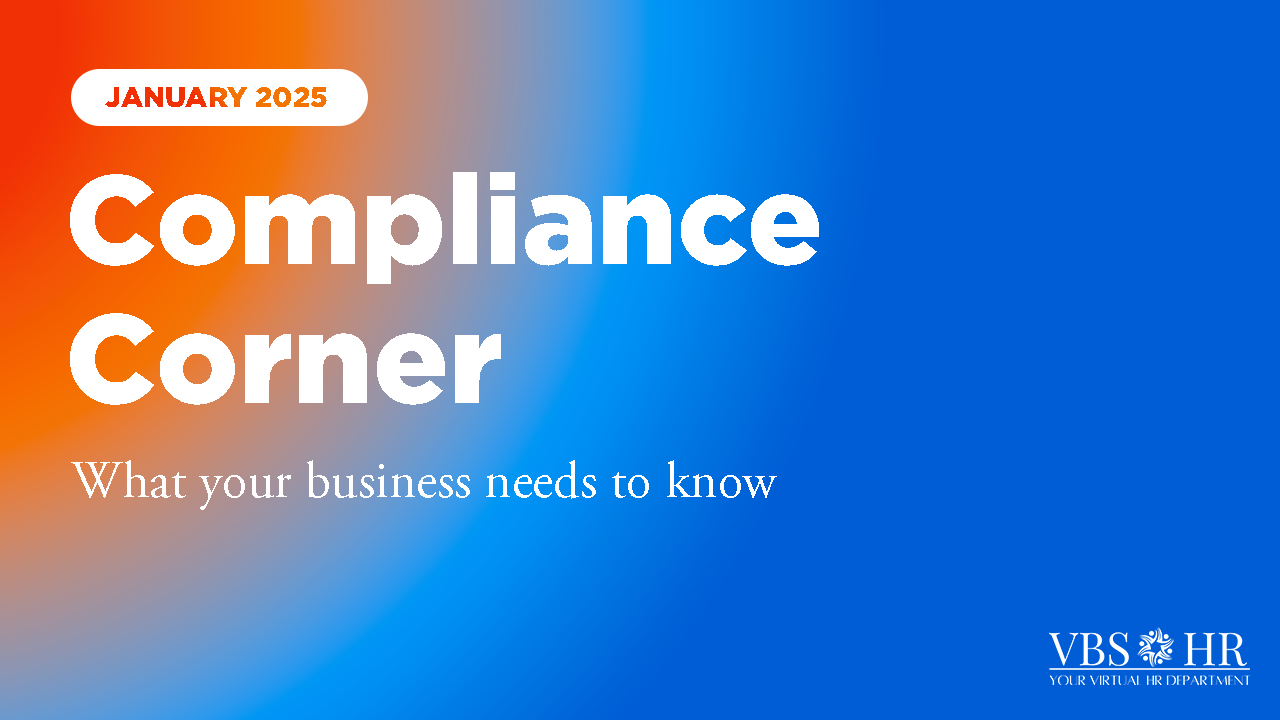Compliance Corner [January 2025]
Your tax dollars at work: Compliance agencies are as active as ever – if not more so. Following are summaries of federal agency activities in January 2025:
Here is what is new in the new year
Bracing for the New Year
California New Regulations
Walt Disney Settlement
DOL Violations & Settlements for November
EEOC Violations & Settlements for November
More on Why It Pays to Seek Accommodation
OFCCP’s New Acceptability Rules for Compliance Audits
Pay Transparency Requirement Coming to New Jersey
Bracing for the New Year
According to Brightmine, over 140 new employment-related regulations are scheduled to take effect on January 1 and about 25 percent of a sample list of over 75 are from California.
California New Regulations
California has a several new regulations starting in January 2025 (unless otherwise noted). A summary follows:
Minimum wage will increase to $16.50/hour, regardless of employer size. Voters had rejected an increase to $18, but some localities already have higher minimum wages.
Implementation of “intersectionality” of two or more protected characteristics in determining the existence of discrimination. While CA is the first state to do so, EEOC has already recognized it in their latest enforcement guidance regarding workplace harassment.
Expansion of the CROWN act to include additional potential ethnically-oriented hairdos.
Limitation of requiring driver’s license in job postings unless the employer “reasonably expects” driving to be a job function AND believes alternate transportation would “not be comparable in time or cost” to the employee. (“Alternative transportation includes but is not limited to “using a ride-hailing service or taxi, carpooling, bicycling, or even walking.”)
Localities are able to enforce antidiscrimination laws subject to the following conditions:
It concerns an employment complaint filed with the California Civil Rights Department (CRD).
It happens after the CRD has issued a right-to-sue notice.
It commences before the statute of limitations to file a civil action expires.
Further, the time to file a civil action specified in the right-to-sue notice will be tolled during any local enforcement.
More protection for victims of violence, including a prohibition against employers’ discriminating for participating in legal processes related to violence, including jury service.
Employers are prohibited from holding “captive audience” meetings. In addition to union drives, employers may not mandate attendance at meetings regarding religious or political topics.
Use of freelance workers for work valued at $250 or more now requires written contracts.
Employers can no longer mandate use of employer-paid leave prior to an employee’s beginning to collect state Paid Family Leave.
2 new poster requirements covering
Whistleblower rights, and
Workers’ compensation.
Posting mandate for the results of an employer-conducted “Social Compliance Audit.” Although such audits are not mandated, if an employer DOES conduct one, the results must be made public.
Finally, climate disclosure reporting will commence in 2026.
Walt Disney Settlement
Walt Disney in California has agreed to settle a lawsuit alleging that it paid male employees $150 million more than female employees in equivalent positions over an 8-year period. The settlement amount: $43.3 million, will be shared among 9000 current and former employees.
DOL Violations & Settlements for November
FLSA
18 cases in 11 states for wage law violations, including minimum wage, miscalculation of overtime pay, child labor (4 different cases!), wage fraud, and threatening of workers who complained about not being paid. Top 2 penalties each over $1.4 Million; most in 5 or 6 figures.
OSHA
9 cases in 7 states, 2 for dangerous workplaces (one over $1 million in fines), one for back wages for worker fired over raising safety concerns, one for an amputation injury and one for inadequate safety measures that led to a stabbing.
FMLA
1 case for worker fired while on FMLA.
DAVIS-BACON ACT
$877K recovered for 36 employees on federal contract in NYC.
EO 11246
2 cases in 2 states: $57K to resolve gender discrimination in a promotion, and $448K to resolve systemic hiring discrimination based on race.
EEOC Violations & Settlements for November
Race Discrimination
2 employers to pay $75K each for race discrimination
Disability Discrimination
4 employers to pay an average of $130K each for violation of ADA, each for failing to make reasonable accommodation
Sex Discrimination/Harassment
1 employer to pay $2.17 million to victim who was repeatedly harassed, and to whose complaints the employer was non-responsive; another employer agreed to pay a total of $270,000 to 4 female recreation therapists who were paid less than a newly-hired male with lower qualifications than theirs, in violation of the Equal Pay Act.
Failure to Accommodate
A ride-hailing service in Texas has been charged with refusing to hire 20 or more hearing-impaired drivers or provide technical or human communication assistance, even though some had prior experience driving for similar companies. The case is still in progress, but EEOC obtained a jury award of $36 million for one truck driver who was denied employment in a similar manner, and a settlement with a nonprofit for over $1 million for failure to accommodate hearing impaired janitorial and maintenance workers.
More on Why It Pays to Seek Accommodation
An IT employee of Blue Cross Blue Shield of Michigan declined to get the COVID vaccine on the basis of her sincerely-held belief that the vaccine was made from or tested with stem cells procured through abortions. BCBS responded by denying her request, then placing her in
unpaid leave, and finally firing her. She sued under both Title VII and a similar Michigan law, and the jury awarded her $12.69 million. BCBS has since re-designed its accommodation process and is “examining legal options.”
OFCCP’s New Acceptability Rules for Compliance Audits
The OFCCP has made MANY changes to its Federal Contract Compliance Manual (FCCM). This book guides examiners as they go over the submissions from federal contractors. The list of updates is very extensive; it is online at https://www.dol.gov/agencies/ofccp/manual/fccm. Over 50 changes have been made, but many of these are simply clarifications and mirror the requirements in the current scheduling letter. However, the following 14 items are either new or different from prior editions, according to Berkshire (whose opinions are also included):
Organizational Profile – No substantive changes, but revisions may cause OFCCP investigators to more strictly enforce the pay sort order (low to high) and the separate identification of “lines of progression.”
AAP Job Groups – Recognizes that higher education institutions use IPEDS, not EEO-1 categories to begin forming job groups; includes unsupported minimum job group size “requirement.”
“Utilization” Analyses – Provide everything necessary for the OFCCP to verify all calculations (external and internal availability, recruiting areas and feeders, factor weights, etc.).
Placement Goals – Yes, the OFCCP is requesting goals from both the prior and current AAPs.
Action-Oriented Programs – The OFCCP wants to see how you developed your action plans (factors considered, reasoning, etc.).
Six-Month Update Data – Six months is the threshold, but submit for as many full months as you are into your current AAP cycle, not just six months.
Employment Transaction Summaries – Break them down by individual race/ethnicity, please.
Compensation Data – Yes, OFCCP is asking for two compensation “snapshots.” No, you are not allowed to limit the population to employees who show up in both.
Compensation Analysis – Simply mirrors Itemized Listing paragraph 22.
Artificial Intelligence Information – Provides more detail on what OFCCP investigators expect; includes questionable requirement to provide written summaries of policies/practices if no formal written policy exists.
Review of Personnel Processes – This requirement is still vague, and the FCCM updates do not provide much clarity.
Outreach and Positive Recruitment (disability and veterans) – Provides more detail on what OFCCP investigators expect to see, but 3 of the 4 examples are unhelpful.
Disability Utilization Goal Analysis – Similar to placement goals, the OFCCP wants to understand how you developed any resulting action plans and expects you to discuss what you submitted for Itemized Listing paragraphs 8 (outreach assessment), 9 (audit and reporting system), and 25 (assessment of personnel processes)
VEVRAA Job Listing Requirement – Misstates the requirement implying that all jobs should be listed, not mentioning the exceptions in the regulations.
Pay Transparency Requirement Coming to New Jersey
Effective June 1, 2025, employers with 10 or more employees in New Jersey will be required to include a wage or salary range in both internal and external job postings. A further requirement is that employers must make a “reasonable effort” to notify employees of promotional opportunities that the company advertises either internally or externally. In addition to the compensation range, notifications must include a general description of benefits and other “compensation programs” for which the employee would be eligible. A first violation would cost the employer $300, with any subsequent violation costing $600. Some cities in NJ have stricter requirements than those above, so employers must comply with the higher standard.
A number of other states are likely to follow this trend, if they have not already done so.
Some Contribution Limits Increasing Slightly in 2025



